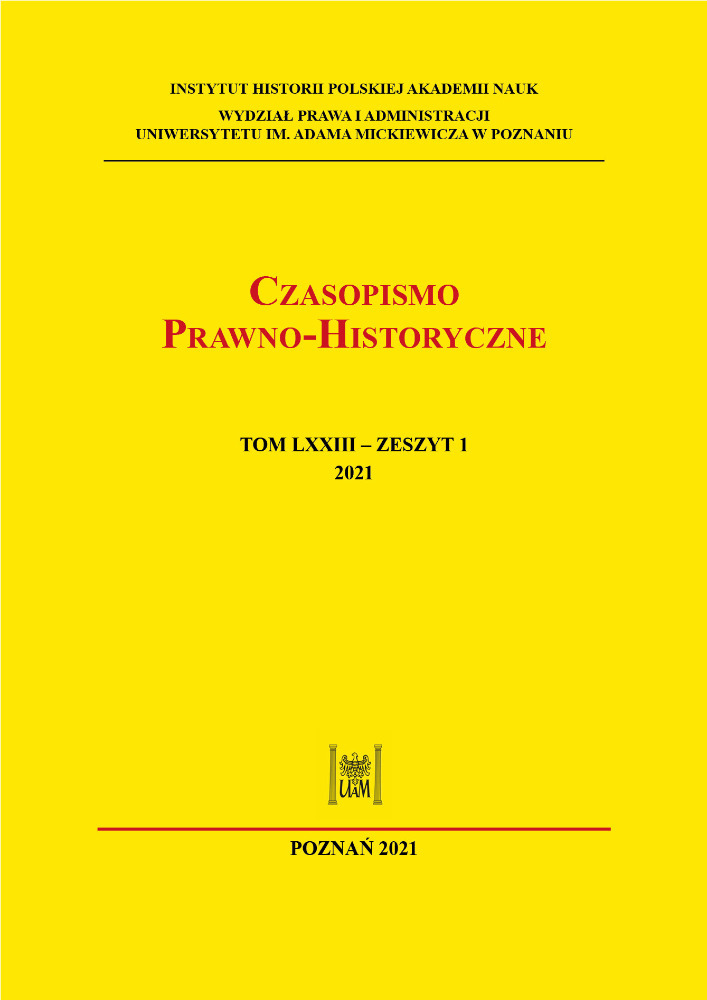Abstract
The paper presents comments on Michał Urbańczyk's book “Idea godności w orzecznictwie Sądu Najwyższego Stanów Zjednoczonych Ameryki” [The idea of dignity in the judicial decisions of the Supreme Court of the United States] (Adam Mickiewicz University Press, Poznań 2019). Michał Urbańczyk rightly indicates that the shift in the judicial decisions of the Supreme Court, consisting in more and more frequent references to the concept of dignity in the justifications, took place in the 1940s. The concept itself first appeared in cases concerning criminal proceedings and the conduct of officers appointed to prosecute crimes. The ruminations and the analyses of the judicial decisions presented in Michał Urbańczyk's book contradict, partially at least, Aharon Barak’s view (“Human Dignity. The Constitutional Value and the Constitutional Right”, Cambridge University Press, Cambridge 2015) according to which the approach to the idea of dignity in this judicial decision is fragmentary and undeveloped. However, one should agree with Barak that the Supreme Court treats dignity as a constitutional value only. The author of the present paper is of the opinion that a characteristic element of the American perception of dignity is accepting the historically evolving understanding of dignity, which changes together with social changes. Such an approach to dignity contrasts with the accepted in the Polish doctrine understanding of dignity as an element of natural law in the positive law system, which implies a rather static understanding of this concept.
References
Alexy R., Human Dignity and Proportionality Analysis, „Espaço Jurídico. Journal of Law” 2015, vol. 16, no. 3.
Barak A., Human Dignity. The Constitutional Value and the Constitutional Right, Cambridge 2015.
Barnett R.E., The People or the State?: Chisholm v. Georgia and Popular Sovereignty, „Virginia Law Review” 2007, vol. 93.
Bayer R., The Common Sense American Republic: the Political Philosophy of James Wilson (1742–1798), „Studia Gilsoniana” 2015, vol. 4, no. 3.
Dürig G., Der Grundrechtssatz von der Menschenwürde: Entwurf eines praktikablen Wertsystems der Grundrechte aus Art. 1 Abs. I in Verbindung mit Art. 19 Abs. II des Grundgesetzes, „Archiv des öffentlichen Rechts” 1956, Vol. 81, No. 2.
Garlicki L., Artykuł 30 [w:] L. Garlicki, M. Zubik (red.), Konstytucja Rzeczypospolitej Polskiej. Komentarz, t. II, Warszawa 2016.
Jefferson T., Projekt statutu wolności religijnych Wirginii, [w:] Wizje Stanów Zjednoczonych w pismach Ojców Założycieli, wybór W. Osiatyński, Warszawa 1977.
Kant I., Groundwork for the Metaphysics of Morals, transl. A.W. Wood, New Haven – London 2002.
Lieber F., On Civil Liberty and Self-Government, Philadelphia 1883.
Lisa R., Naród, unia, stany. Problemy federalizmu i suwerenności w myśli politycznej „Federalisty”, „Studia Polityczne” 2016, nr 1.
Łętowska E., O godności, jej funkcji w obrocie prawnym i promocyjnej roli Rzecznika Praw Obywatelskich [w:] Godność człowieka a prawa ekonomiczne i socjalne. Księga jubileuszowa wydana w piętnastą rocznicę ustanowienia Rzecznika Praw Obywatelskich, Warszawa 2003.
Mahlmann M., Human Dignity and Autonomy in Constitutional Orders [w:] M. Rosenfeld, A. Sajó (red.), The Oxford Handbook of Comparative Constitutional Law, Oxford 2012.
Małajny R.M., Doktryna wolności religijnej „Ojców Konstytucji” USA, „Czasopismo Prawno-Historyczne”, 1982, t. XXXIV, z. 2.
Moore D., Crimes Involving Moral Turpitude: Why the Void-for-Vagueness Argument is Still Available and Meritorious, „Cornell International Law Journal” 2008, vol. 41, no. 3.
Nawrocka A., Jednostka a państwo: rozważania o godności człowieka i obowiązkach obywatela w „De ojficiis” M.T. Cycerona, „Studia Philosophiae Christianae” 1984, t. 20, nr 2.
Post R.C., Justice Brennan and Federalism, „Constitutional Commentary” 1990, vol. 7.
Rosenkranzová O., Lidská důstojnost: Právně teoretická a filozofická perspektiva. Giovanni Pico della Mirandola & Immanuel Kant, Leges, Praha 2019.
Seidler G.L., W nurcie Oświecenia, Lublin 1984.
Szymaniec P., Koncepcje wolności religijnej. Rozwój historyczny i współczesny stan debaty w zachodniej myśli polityczno-prawnej, Wrocław 2017.
Szymaniec P., Republikanizm dla społeczeństwa handlowego. Myśl polityczno-prawna Adama Fergusona, Wałbrzych 2013.
Urbańczyk M., Idea godności człowieka w orzecznictwie Sądu Najwyższego Stanów Zjednoczonych Ameryki, Wydawnictwo Naukowe UAM, Poznań 2019.
Urbańczyk M., Od godności dobrze urodzonych po egalitarne szlachectwo dla wszystkich. Szkice ze studiów nad ideą godności człowieka, „Czasopismo Prawno-Historyczne” 2014, t. LXVI, nr 2.
Urbańczyk M., Przeciw segregacji rasowej: idea nonviolence i jej filozoficzne korzenie w myśli społecznej Martina Luthera Kinga, „Filo-Sofija” 2015, r. 15, nr 2, cz. 2.
Watford P.J., Hallows Lecture: Screws v. United States and the Birth of Federal Civil Rights Enforcement, „Marquette Law Review” 2014, vol. 98, no. 1.
Wojtyczek K., Ochrona godności człowieka, wolności i równości przy pomocy skargi konstytucyjnej w polskim systemie prawnym [w:] K. Complak (red.), Godność człowieka jako kategoria prawna (opracowania i materiały), Wrocław 2001.
License
Copyright (c) 2021 Piotr Szymaniec

This work is licensed under a Creative Commons Attribution-ShareAlike 4.0 International License.





